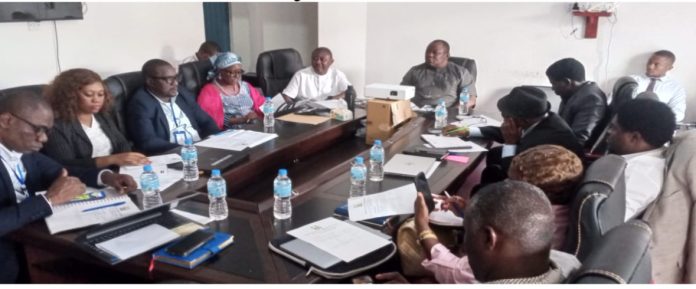By Hassan Osman Kargbo
The Tripartite Steering Committee Secretariat on Tuesday, July 29, hosted its first inter-agency meeting at its conference room, bringing together key institutions to assess progress on implementing the Tripartite Committee’s recommendations.
The meeting featured presentations from the Electoral Commission for Sierra Leone (ECSL), Political Parties Regulation Commission (PPRC), Sierra Leone Broadcasting Corporation (SLBC), Independent Political Commission Board (IPCB), and the Public Sector Reform Unit (PSRU). Each institution provided updates on their assigned responsibilities as outlined in the Tripartite Committee’s report.
In his opening statement, Ngolo Katta, Coordinator of the Tripartite Secretariat, emphasized the importance of tracking implementation efforts with clear data. He noted that this would help identify both progress and existing gaps that could attract donor assistance. Katta acknowledged the dedication demonstrated by the various agencies and underlined the Secretariat’s commitment to keeping the public informed throughout the implementation process.
“For the public to build trust in these reforms, we must be transparent and proactive in reporting our progress. It is not only about updating the Tripartite Steering Committee but ensuring citizens are carried along every step of the way,” he said.
The ECSL, which has the highest number of recommendations — 65 in total — reported significant progress, particularly in the development of the Commission’s strategic plan. Recommendations 1 and 3, focusing on the creation of a consultation policy and an information management policy, are currently being addressed with support from the European Union. A consultant engaged by the EU is close to delivering a draft report on the two policies.
ECSL’s Executive Secretary further revealed that efforts are underway to operationalize key electoral processes, including the publication of the electoral calendar and the development of an operational plan for voter registration and result management systems. The United Nations Development Programme (UNDP) is set to assign two experts to conduct a visibility study, whose findings will directly support the implementation of these tasks.
The PPRC, which is responsible for nine recommendations, reported that most of its tasks are legislative in nature. Among the most pressing issues are the regulation of political finances and curbing the formation of political militias — two matters the Commission considers critical to long-term democratic stability.
SLBC was assigned Recommendation 77, which calls for deep institutional reform. Director-General Josephine Kamara said the broadcaster is awaiting the publication of a management and functional review conducted by the PSRU. According to Kamara, the findings of the review will serve as the foundation for rebuilding SLBC’s governance structure and addressing its institutional decline.
The PSRU’s role, particularly in facilitating reviews and reforms for institutions like SLBC, was also highlighted as central to ensuring long-term sustainability and effectiveness of the implementation efforts.
The inter-agency meeting marked an important milestone in the Secretariat’s coordination efforts and provided a platform for mutual accountability among state institutions. Participants reiterated the need for collaboration, transparency, and ongoing dialogue to ensure that the Tripartite Committee’s recommendations are fully and effectively implemented in the interest of national development and democratic consolidation.













